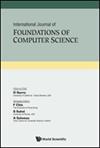最难的英语语言
IF 0.6
4区 计算机科学
Q4 COMPUTER SCIENCE, THEORY & METHODS
International Journal of Foundations of Computer Science
Pub Date : 2023-02-01
DOI:10.1142/s012905412344001x
引用次数: 1
摘要
本文建立了一个类似于Greibach最难语言定理(“最难上下文无关语言”,SIAM J. Comp., 1973, http://dx.doi.org/10.1137/0202025)的经典LL(公式:见文本)语言族。第一个结果是存在一种由Greibach范式的LL(1)语法定义的语言[公式:见文],而每一种由Greibach范式的LL(1)语法定义的语言[公式:见文]都可以被同态约简,即当且仅当[公式:见文]。然后证明,这一说法并不适用于LL([公式:见文本])语言的整个类。然后其他困难的语言定理是成立于以下形式:有一个语言(公式:看到文本)定义为一种LL(1)文法Greibach范式,这样,每一个语言(公式:看到文本)定义为一个会([公式:看到文本])语法,(公式:看到文本),存在一个同态(公式:看到文本),因为(公式:看到文本)当且仅当[公式:看到文本][公式:看到文本][公式:看到文本],在[公式:看到文本]是一个新的象征。这些结果导致了两个鲁棒语系:在逆同态和逆有限转导下,由LL(1)语法在Greibach范式下定义的语言闭包。本文章由计算机程序翻译,如有差异,请以英文原文为准。
The Hardest LL(k) Language
This paper establishes an analogue of Greibach’s hardest language theorem (“The hardest context-free language”, SIAM J. Comp., 1973, http://dx.doi.org/10.1137/0202025 ) for the classical family of LL([Formula: see text]) languages. The first result is that there is a language [Formula: see text] defined by an LL(1) grammar in the Greibach normal form, to which every language [Formula: see text] defined by an LL(1) grammar in the Greibach normal form can be reduced by a homomorphism, that is, [Formula: see text] if and only if [Formula: see text]. Then it is shown that this statement does not hold for the full class of LL([Formula: see text]) languages. The other hardest language theorem is then established in the following form: there is a language [Formula: see text] defined by an LL(1) grammar in the Greibach normal form, such that, for every language [Formula: see text] defined by an LL([Formula: see text]) grammar, with [Formula: see text], there exists a homomorphism [Formula: see text], for which [Formula: see text] if and only if [Formula: see text] [Formula: see text] [Formula: see text], where [Formula: see text] is a new symbol. The results lead to two robust language families: the closures of the languages defined by LL(1) grammars in the Greibach normal form under inverse homomorphisms and under inverse finite transductions.
求助全文
通过发布文献求助,成功后即可免费获取论文全文。
去求助
来源期刊

International Journal of Foundations of Computer Science
工程技术-计算机:理论方法
CiteScore
1.60
自引率
12.50%
发文量
63
审稿时长
3 months
期刊介绍:
The International Journal of Foundations of Computer Science is a bimonthly journal that publishes articles which contribute new theoretical results in all areas of the foundations of computer science. The theoretical and mathematical aspects covered include:
- Algebraic theory of computing and formal systems
- Algorithm and system implementation issues
- Approximation, probabilistic, and randomized algorithms
- Automata and formal languages
- Automated deduction
- Combinatorics and graph theory
- Complexity theory
- Computational biology and bioinformatics
- Cryptography
- Database theory
- Data structures
- Design and analysis of algorithms
- DNA computing
- Foundations of computer security
- Foundations of high-performance computing
 求助内容:
求助内容: 应助结果提醒方式:
应助结果提醒方式:


